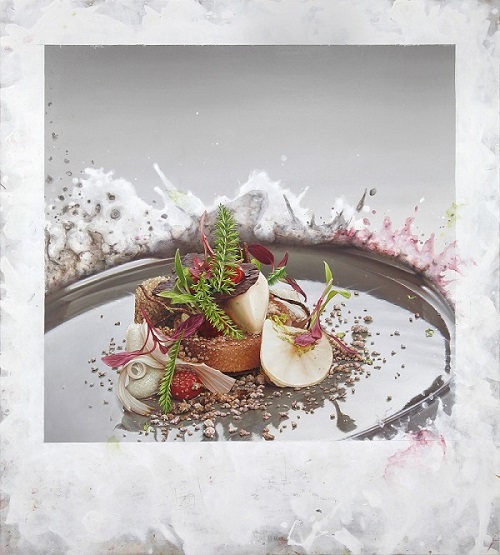Summary |
A studio-based research project that examines the pictorial compositions of contemporary food imaging. |
|---|---|
Start Date |
July 21, 2018 12:00 pm |
End Date |
July 30, 2018 5:00 pm |
Venue |
Plimsoll Gallery |
Re-contextualising the Spectacle of Online Gastronomy: A Studio Investigation into Contemporary Food Imaging.

Image credit: Nathan Taylor, Untitled III, 2017, Acrylic on board, 94.5 x 85cm
Opening event: Fri 20 July, 5.30 – 7.00 pm
Exhibition dates: Sat 21 July – Thurs 30 July , 2018
Gallery Hours: Wed - Sun 12pm - 5pm (during exhibitions)
Closed Tuesdays and Public holidays
Abstract:
This studio-based research project examines the pictorial compositions of contemporary food imaging. It investigates how painting and time-based media can effectively reframe identified visual tropes to broaden understanding around the evolving relationships to food images. The research is focused on high-end food imagery, which represents the rise of autonomous visual-based food genres online, including, but not limited to, chef websites, curated image feeds and food porn. Explored through a dual medium approach, this thesis identifies how the interactive practices of digital media, image manipulation and social media, are redefining photographic representation within this genre. This includes examining the role of exaggerated visual tropes, design, styling and performative elements, in the mediation of cultural meanings within food representation.
Artworks within this thesis present a multi-textured exploration of hyper-realistic representation and aim to activate a sense of the uncanny by de-contextualising gesture through animation and looping, as well as through painted digital styling. Presenting both painted and photographic representation, examines the varying degrees of collapsed and expanded critical distance that the viewer maintains with contemporary images. By analysing the visual tropes of food imaging and the influence of digital technologies on its aesthetic evolution, this studio-based research proposes that food imaging is now a dynamic currency of cultural exchange within the online visual economy.